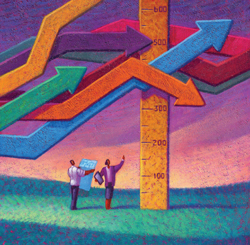The State of Equity
In three successive Tisch lectures last winter, former Visiting Professor Richard Rothstein outlined his vision for a Teachers College Report Card on equity in education that would consider a wide range of indicators in assessing the fairness of
"What gets measured, get s done," said Rothstein, a research associate at the Economic Policy Institute. "The current accountability system makes American education more inequitable in other areas because the places that are weakest in basic skills are most likely to reduce effort in other subjects to increase drills in math and reading."
The new report card--which Rothstein has been developing for the past year and a half with two TC graduate assistants, Rebecca Jacobsen and Tamara Wilder - would assess the progress of individual states in developing not only fundamental skills in subjects such as reading and math, but also in critical thinking, social skills and work ethic, citizenship, physical health, emotional health, the arts and literature, and vocational education.
According to Rothstein, that list is much more in keeping with what
During the lectures, Rothstein shared initial data collected from state sources, but lamented the data's inconsistency and the fact that it reflects student performance only up through the eighth grade.
"Clearly eighth-grade performance in basic academic skills is an incomplete measure of student achievement, while performance in 12th grade is a much better indicator of how a student will perform post-high school," Rothstein said. "Yet eighth-grade data are all we have at the state level - and even on this measure, we don't have the data for all states."
Accordingly, Rothstein and his assistants are developing detailed recommendations for public and private organizations regarding the expansion of existing surveys and proposals for new data collection that could be commissioned by The Campaign for Educational Equity. "These data will allow us to produce reports that should provide incentives for policymakers to redouble their efforts to achieve equity, secure in the knowledge that they're not being asked to do anything not already being done in other states," Rothstein said. "They will also know that in undertaking efforts to achieve balanced equity, they are not spurring the unintended consequence of improving equity in one goal at the price of greater inequity in others."
Published Tuesday, Sep. 26, 2006
